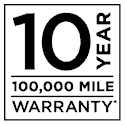This week, we’re sharing a list of emergency supplies that you should always have in your vehicle. It’s important to be prepared (why do you think it’s the Boy Scout motto?) and we’re all about that kind of life. So, take a look at our list and make sure you’ve got these items on hand, just in case you need them. Just when you think you don’t, well, that’s always when you do.
1. Charged cell phone. Although this item will probably be on your person, it may make the difference between getting help fast and maybe not getting help at all.
2. First-aid kit with an assortment of Band-Aids, adhesive tape, gauze pads, aspirin, antiseptic wipes, antiseptic cream or ointment, and anything particular to you or your family, like extra medication or other necessities, like Lactaid or similar.
3. Fire extinguisher, rated for Class B and Class C fires by the National Fire Protection Association or NFPA. The NFPA says Class B fires are those that involve flammable or combustible liquids, such as gasoline, diesel fuel, and kerosene. Class C fires involve energized electrical equipment such as switches, panel boxes, and batteries. These are both dangers in a vehicle!
4. Three reflective warning triangles. While many prepackaged emergency kits contain one warning triangle, you should have three that are placed 50 feet apart to warn oncoming traffic. In a pinch, though, one will do.
5. Tire gauge. You should use the tire gauge in their car emergency kit to periodically check the air pressure in their spare tire.
6. Foam tire sealant is a quick, inexpensive way to repair many flats without changing the tire.
7. Jumper cables that are at least 10 feet in length and coated with at least 8-gauge rubber.
8. Flashlight and extra batteries. The flashlight should be waterproof.
9. Gloves
10. Rags
11. Duct tape, the universal fix-it solution. You should carry at least 10 feet of it.
12. Tow strap or tow rope that is strong enough to tow 6,000 pounds.
13. Multipurpose utility tool, like a Leatherman or a Swiss Army knife.
14. Rain poncho. Even an inexpensive plastic poncho is better than nothing when changing a tire in the pouring rain.
15. Drinking water.
16. Non-perishable snacks. Protein bars are a good choice.







 Warranties include 10-year/100,000-mile powertrain and 5-year/60,000-mile basic. All warranties and roadside assistance are limited. See retailer for warranty details.
Warranties include 10-year/100,000-mile powertrain and 5-year/60,000-mile basic. All warranties and roadside assistance are limited. See retailer for warranty details.